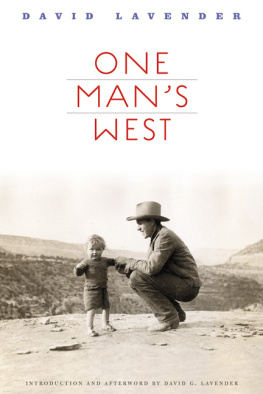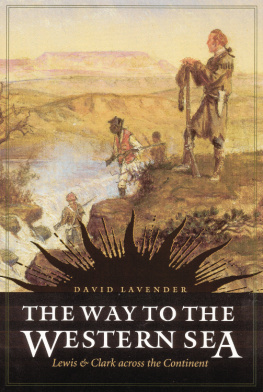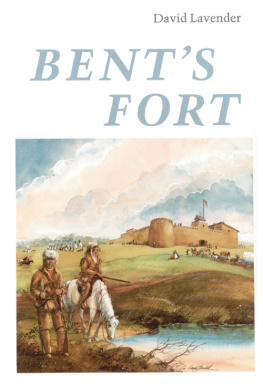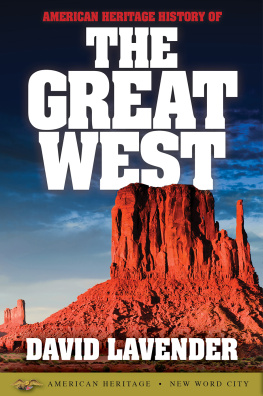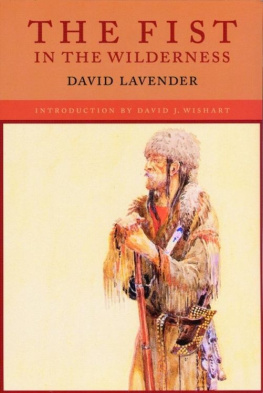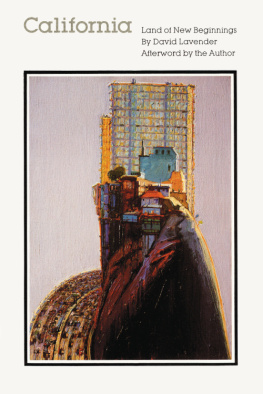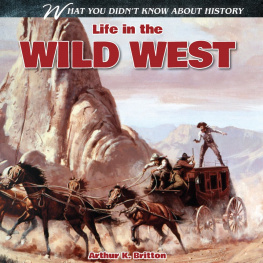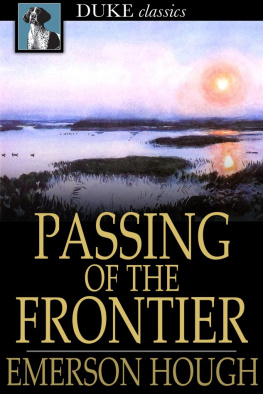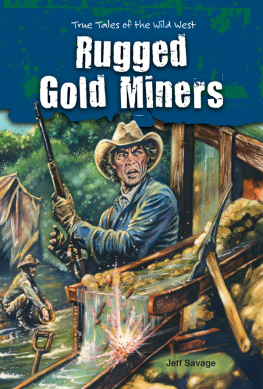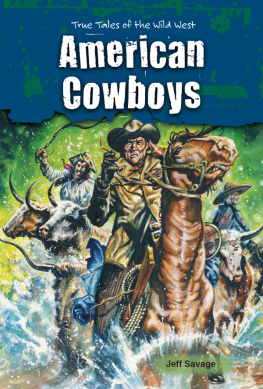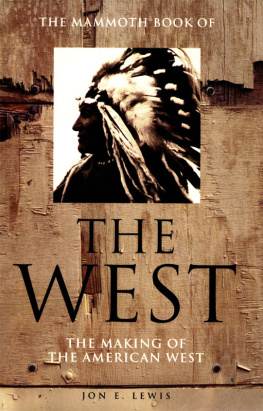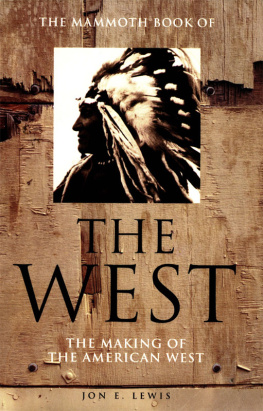
ONE MANS WEST
New Edition
By DAVID LAVENDER
Line drawings by WILLIAM ARTHUR SMITH

Introduction and afterword to the Bison Books edition by DAVID G. LAVENDER
Tribute to the author by DAVID W. LAVENDER

To BROOKIE
Who appears in these pages under her given name Martha
1943, 1956 by David Lavender
Introduction 2007 by the Board of Regents of the University of Nebraska
Afterword 2007 by the Board of Regents of the University of Nebraska Tribute to the author 2007 by the Board of Regents of the University of Nebraska
All rights reserved
Manufactured in the United States of America

First Nebraska paperback printing: 1977
Photographs on pp. xxi-xxix courtesy of the authors family.
This Bison Books edition is reproduced from the third (1964) edition, published by Doubleday & Company, Inc., by arrangement with the author.
Library of Congress Cataloging-in-Publication Data
Lavender, David Sievert, 19102003.
One mans West / David Lavender; introduction and afterword to the Bison Books edition by David G. Lavender; tribute to the author by David W. Lavender; line drawings by William Arthur Smith.New ed.
p. cm.
Reproduced from the third (1964) edition, published by Doubleday & Company, Inc., by arrangement with the authorT.p. verso.
ISBN-13: 978-0-8032-6030-6 (paper: alk. paper)
1. Lavender, David Sievert, 19102003. 2. CowboysColoradoBiography. 3. MinersColoradoBiography. 4. Ranch lifeColoradoHistory20th century. 5. Mines and mineral resourcesColoradoHistory20th century. 6. Mining campsColoradoHistory20th century. 7. ColoradoSocial life and customs20th century. 8. ColoradoDescription and travel. 9. ColoradoBiography. 10. Telluride (Colo.)Biography. I. Title.
F781.L3A3 2007
978.8033dc22 2007014341
E-book ISBN: 978-0-8032-6047-4
INTRODUCTION
David G. Lavender
I am the only child born of the marriage of this books author and his beloved wife, Martha. Passing reference to my existence is made here and there in the narrative. I am the baby sleeping through the Christmas party and the adolescent admiring a teenaged girl in Moab, Utah.
I arrived at a difficult time; the familys cattle ranch was going through economic hardship, and my uncle Dwight died less than three months after I was born. Still, I think my mother and father were glad to have me around, and as I grew older and began to understand that my infancy was rather unusual, I became fascinated with my parents story and amazed that they were fated to meet and marry. My fathers first book has always been my favorite, and I have reread it many times over the years. The land and the adventures he describes in One Mans West shaped my life and the lives of my wife and our children and grandchildren.
Recently, my wife, Val, and I began spending a portion of each year in Montrose, Colorado. Soon after we first arrived, we met a delightful woman named Ramona Hawk, a resident in a retirement home there. Though I obviously didnt remember her, I knew that she had been my nanny at the familys summer ranch (aptly named the Summer Camp) during the summer of 1935, when I was one year old. We became close friends. One thing led to another, and before long I had volunteered to read one afternoon a week to Ramona and a number of other residents of the Homestead, several of whom had spent most of their lives in Telluride and the west end of San Miguel County. The first book I read was One Mans West, and I was delighted that they enjoyed it just as much as I had over the years.
Each time Val and I visit Ramona, she goes on at length about how she loved that summer of 1935how she respected my grandmother and felt tremendous affection for that wonderful Dave Lavender and his beautiful wife. She told stories that Id not heard before and brought a new immediacy to life at the Summer Camp. Her accounts of my mothers horseback riding and sharing in the work of the ranch heightened a belief Id long held that it really is amazing that two people from such vastly different backgrounds would have had such a deep love and strong marriage.
After my father died in 2003, I came into possession of scores of letters he wrote to my mother during their courtship and a number of diaries that she kept during those years. Some of those letters, particularly those written from the Camp Bird mine, are clearly the genesis of portions of One Mans West, while the diary entries provide a vivid description of an eastern girls enthrallment with southwestern Colorado. Ramona, the letters, and the diaries together made me feel that when the time came to publish a new edition, addenda should be included that would provide another perspective on my parents unique love affair and that also would describe briefly some of the other activities my remarkable father pursued after he left the ranch. This introduction and the afterword are designed to provide this information; I hope they succeed and that they will be useful additions to his first book.
My father was born in Telluride, Colorado, on February 4, 1910. His mother, Edith, was one of five daughters born to James E. Garrigues of GreeleyChief Justice of the Colorado Supreme Court for several years. Edith graduated from Denver University when it was known as the Colorado Seminary. While there, she met David Painter, a fellow student and a member of one of Tellurides leading families. They married, and she accompanied David to Telluride, where she taught school and he worked for his fathers newspaper. They had two sons, my father and his younger brother, Dwight, who was born in 1912. For some reason the marriage just didnt work. Edith and David separated, attempted to reconcile, but eventually divorced in 1916an unusual occurrence in the early 1900s, to say the least. Edith moved to Denver for a time, but after a difficult period of adjustment she returned to Telluride and married Edgar Lavender in 1921. A few years later he adopted both of the boys.
I sense that Eds stepsons respected him greatly and were fond of him but never developed deep love or affection for him, though they certainly learned much from himI know Dad regarded him as his most influential male role model. Ed was an interesting man. He came to Telluride from South Dakota while still in his teens. He built a thriving businessa freight line that hauled supplies to the mines located high above Telluride. Eventually, however, his mules and wagons were replaced by aerial tramways, and it was time to turn to other pursuits. Purchasing land one parcel at a time and leasing much acreage in southwestern Colorado from the federal government, Ed developed one of the largest cattle ranches in that part of the United States.
Ed was a wealthy man for a decade or more, and his operation was respected throughout the West. He shipped his cattle to the Denver stockyards, and he was in that city frequently. At the Denver Club, he gained quite a reputation as a poker and bridge player. Edith lived in Denver during the academic year so the boys could attend school in the city. Ed was extremely generous to his stepsons. He sent my father to Mercersburg Academy in Pennsylvania and then to Princeton University.
Next page
